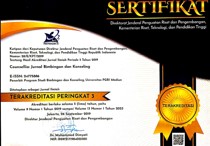Memahami perilaku kemandirian belajar Siswa melalui perspektif Human Agency: Sintesis perspektif Human Agency
DOI:
https://doi.org/10.25273/counsellia.v10i2.6761Keywords:
Autonomous Learning Behaviour, Human AgencyAbstract
Human agency adalah konsep bahwa seorang individu memiliki kompetensi dalam perencanaan, disiplin, realisasi dan mengevaluasi perilaku mereka sendiri dalam keadaan hidup termasuk dalam pembelajaran. Ini telah dipelajari dalam pendidikan dengan empat sifat inti seperti sengaja, pemikiran, reaktivitas diri, dan reflektifitas diri membentuk individu sebagai aktor, bukan reaktor. Hal ini dapat digunakan untuk memahami pembelajaran mandiri siswa, karena konsep pembelajaran mandiri memiliki kesadaran diri secara sengaja. Jika individu selalu bergantung pada lingkungannya, itu karena ia tidak memiliki agen dalam keadaan hidupnya. Menurut sebuah penelitian terbaru yang dilakukan pada tahun 2012, telah menemukan bahwa seorang siswa memiliki kurang otonom dalam belajar, dan juga dari survei yang dilakukan pada 2017-2019 ditemukan bahwa 61,50% siswa di 4 sekolah menengah atas memiliki pembelajaran mandiri yang lebih rendah. Fenomena ini mempengaruhi perilaku selingkuh dan menunda-nunda mereka. Pada artikel ini akan membahas kondisi siswa dalam belajar dan memberikan rekomendasi baru dalam perspektif tentang intervensi alternatif dalam praktik bimbingan dan konseling tentang agensi manusia untuk membentuk dan memahami perilaku belajar mandiri dan juga sifat internalisasi agensi manusia dalam proses konseling dalam konteks dalam belajar.
Downloads
References
Apriyadi, F. (2014). Peningkatan Kemandirian Belajar Siswa dalam Pembelajaran Matematika Melalui Metode College Ball. Universitas Muhamadiyah Surakarta, Tidak Diterbitkan.
Alfaiz & Yandri H (2015). Self Concept and Self Efficacy As A Ground Points in A Social Activities (An Analysis of Psychology Perspective: A Social Cognitive Theory). Jurnal Pelangi. Vol. 7. No. 2. pp 45–52. https://ejournal.stkip-pgri-sumbar.ac.id/index.php/pelangi/article/view/203. https://doi.org/10.22202/jp.2015.v7i2.203. DOI: https://doi.org/10.22202/jp.v7i2.203
Alfaiz, Zulfikar & Yulia, D. (2017). Efikasi Diri sebagai Faktor Prediksi Kesiapan Mahasiswa dalam Mengerjakan Tugas Kuliah. Jurnal. Ilmu Pendidikan: Jurnal Kajian Teori dan Praktik Kependidikan. Vol. 2. No. 2. Pp 119–24. https://journal2.um.ac.id/index.php/jktpk/article/view/2546. http://dx.doi.org/10.17977/um027v2i22017p119. DOI: https://doi.org/10.17977/um027v2i22017p119
Alfaiz, A., Yandri, H., Yuzarion, Y., Lestari, L.P.S., & Heriyani, E. (2019a). Persepsi Agentik Individu untuk Mencapai Prestasi Pribadi dalam Aktivitas Karir: Riset Pendahuluan. Psychocentrum Review. Vol. 1. No. 2. p.85–95. https://doi.org/10.30998/pcr.1276, https://journal.unindra.ac.id/index.php/pcr/article/view/76. DOI: https://doi.org/10.30998/pcr.1276
Alfaiz, A., Hidayah, N., Hambali, I. & Radjah, C. (2019b). Human Agency as a Self-Cognition of Human Autonomous Learning: A Synthesized Practical of Agentic Approach. Journal of Social Studies Education Research. 10(4). 370-391. Retrieved August 4, 2020 from https://www.learntechlib.org/p/216528/. https://www.jsser.org/index.php/jsser/article/view/1370
Alfaiz, A. (2018). Guidance and Counseling Profession: a Philosophy and Professional Challenges In The Future. Couns-Edu: International Journal of Counseling and Education. 3(1): pp. 44-47. DOI: https://doi.org/10.23916/0020180313420. http://journal.konselor.or.id/index.php/counsedu/article/view/134 DOI: https://doi.org/10.23916/0020180313420
Alfaiz, Rafiola R.H, Triyono, Dianto M, Suarja, S, Hidayah, N, Ramli, M, & Yuzarion. (2020). Student Personal Agency Weakness in Autonomous Learning: Preliminary Research, International Journal of Innovation, Creativity and Change. Vol. 13, Issue 7, Pp 973-989. https://www.ijicc.net/index.php/volume-13-2020/191-vol-13-iss-7.
Bandura, A. (1997). Self efficacy : The Exrecise of Control. Freeman and Company: USA.
Bandura, A. (1986). Social Foundation of Thought and Action: Social Cognitive Theory. Englewood Cliffs, New Jersey: Prentice-Hall.
Bandura, A. (1977). Social Learning Theory. Englewood Cliffs, New Jersey: Prentice Hall.
Bandura, A. (1989). Human Agency in Social Cognitive Theory. American Psychologist, Vol. 44, (9). DOI: https://doi.org/10.1037//0003-066X.44.9.1175
Bandura, A. (1999). Social Cognitive Theory: An Agentic Perspective. Asian Journal of Social Psychology, Blackwell Publisher. DOI: https://doi.org/10.1111/1467-839X.00024
Bandura, A. (2001). Social Cognitive Theory: An Agentic Perspective. Annual Review Psychological. DOI: https://doi.org/10.1146/annurev.psych.52.1.1
Bandura, A. (2006). Toward a Psychology of Human Agency. American for Psychological Science. DOI: https://doi.org/10.1111/j.1745-6916.2006.00011.x
Bandura, A. (1982). Self Efficacy Mechanism in Human Agency. American Psychologist, Vol.37, No 2. DOI: https://doi.org/10.1037//0003-066X.37.2.122
Elfira, N. (2013). Peningkatan Kemandirian Belajar Siswa Melalui Layanan Bimbingan dan kelompok. Jurnal Konselor. UNP. DOI: https://doi.org/10.24036/0201321728-0-00
Healey, M. (2014). Developing Independent & Autonomous Learning. Researcher Paper.
Hidayah, N & Ramli, M. (2017). Need of Cognitive behavior Counseling model base on local wisdom to Improve meaning of life of madurese culture junior high school student. Proceeding of International Conference on Education and training (ICET) 2017. Atlantis Press. https://www.atlantis-press.com DOI: https://doi.org/10.2991/icet-17.2017.53
Isa, A. (2014). Integrating Self Reliance Education Curriculum for Purdah Women in Northern Nogeria: A Panacea for a lasting Culture of Peace. Journal of Research & Method in Education.
Miles, M. B., Huberman, M. A., & Saldana, J. (2014). Qualitative Data Analysis: A Methods Sourcebook. In BMC Public Health (Third Edit, Vol. 5). California: Sage Publication.
Rianawati. (2017). Internalisasi Karakter Kemandirian Melalui Pembelajaran Konstruktif di Perguruan Tinggi, IAIN Pontianak.
Schunk, D. (2008). Learning Theories: an Educational Perspective. Fifth Edition. Pearson: New Jersey
Saefullah. (2013). Hubungan antara Sikap Kamandirian Belajar dan Prestasi Belajar Siswa kelas X pada Pembelajaran Fisika Berbasis Portofolio. Jurnal Wahana Pendidikan Fisika, Vo. 1 tahun 2013. ISSN: 2338-1027.
Lerner, R.M & Steinberg, L. (2004). Handbook of Adolescence Psychology. Second Edition. John Wiley & Sons, New Jersey.
Sulistyaningsih. (2018). Kemandirian Belajar dan Prestasi Belajar Matematika Siswa SMP Negeri 27 Purworejo. Universitas Muhammadiyah Purworejo.
Yamazumi, K. (2007). Human Agency and Educational Research: A New Problem in Activity Theory. An International Journal of Human Activity Theory. No 1. Kansai University.
Zwickel, J. (2009). Agency Attribution and Visuospatial Perspective Taking. Psychonomic Bulletin & review, No 16 (6). DOI: https://doi.org/10.3758/PBR.16.6.1089
Downloads
Published
Issue
Section
License
In order to be accepted and published by Counsellia: Jurnal Bimbingan dan Konseling, the author(s) submitting the article manuscript should complete all the review stages. By submitting the manuscript the author(s) agreed to the following terms:
The copyright of received articles shall be assigned to Counsellia: Jurnal Bimbingan dan Konseling. The intended copyright includes the right to publish articles in various forms (including reprints). Counsellia: Jurnal Bimbingan dan Konseling maintain the publishing rights to the published articles.
Authors are allowed to use their articles for any legal purposes deemed necessary without written permission from Counsellia: Jurnal Bimbingan dan Konseling with an acknowledgement of initial publication to this journal.
Author sent the copyright transfer form (here) to the journal.

This work is licensed under a Creative Commons Attribution-NonCommercial-ShareAlike 4.0 International License.






